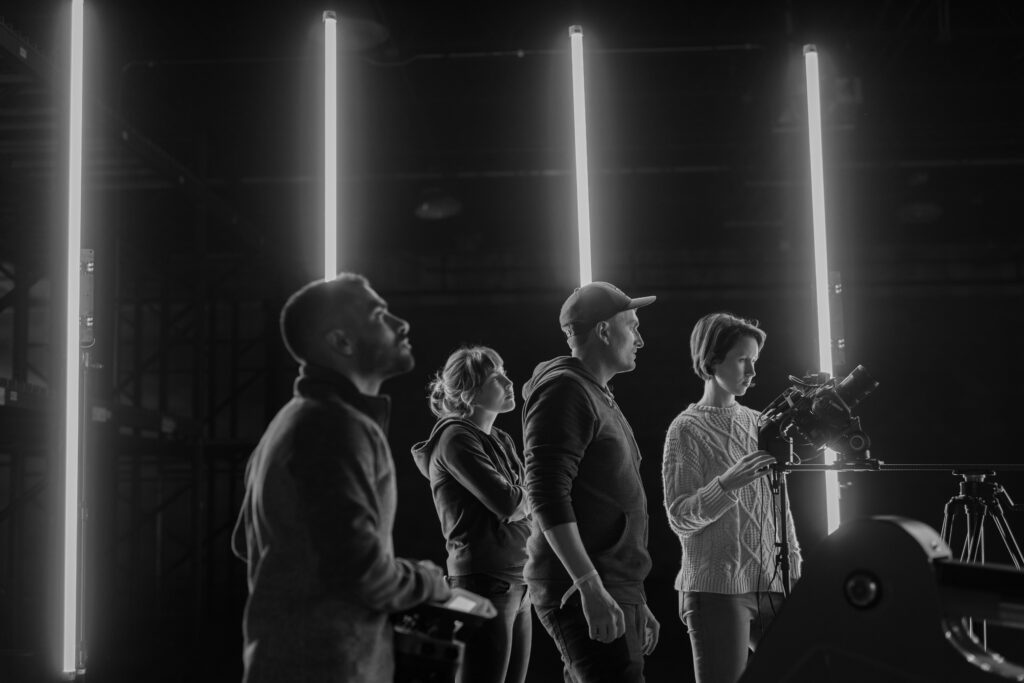Chris Peters ’09 on the Importance of Visual Storytelling in Modern Marketing
Chris Peters ’09, who studied communication arts at Gordon, now works as a principal for Lightmark Creative, a video production and marketing consultancy he founded. We sat down with him to ask about his experience navigating the video and media industry while also managing his own business.
Where did your passion for film and videography start?

From an early age, I’ve always been drawn to visual storytelling. With no other medium do we connect or resonate so strongly as humans: we can have a multi-sensory, emotional, spiritual or even physical reaction because it is engaging all our senses. From the beginning, I always found that exciting—that opportunity to use those different channels of communication and be intentional and strategic with them.
Practically speaking, I ended up taking an independent film class in high school, and someone there had a connection that gave me a chance to work with some Hollywood productions. I worked on a few things in the Wilmington, N.C., area, like the movie Idlewild starring the hip-hop group OutKast and TV series One Tree Hill. The Idlewild crew then was asked to do a pilot on location in Hawaii, but I was about to graduate from high school and I really wanted to go to college. I found out later that the pilot ended up being JJ Abrams’s Lost, which ran for 7 years. But that experience ignited this interest of mine in visual storytelling.
How did you end up founding Lightmark Creative?
I graduated from Gordon in December 2008, which was right at the peak of the economic recession. I had a job lined up at an agency, and then it completely went under. So, I took on a side video project, then another, then another. It was a chance to help other organizations find what makes them unique and then create a compelling visual story from that. A friend of mine from Gordon helped me with branding, and we landed on Lightmark Creative, a reference to how video or film is created and viewed by combining different combinations of light waves. Eventually, I had great connections and clients who gave me a lot of work, and soon there was enough demand to start hiring people. So, I got my LLC in 2017 and started growing the team and the business to what it is today.
Since you started Lightmark Creative, how has the film industry changed or grown?

Since 2008, the film and video industry has changed so dramatically. The whole industry has really transitioned from film to digital video. Streaming giants like YouTube, Netflix, TikTok didn’t exist back then. All tools from cameras to editing technology have changed dramatically to make video much more accessible and the entry point much lower. How to get into filmmaking has changed as well. You don’t have to go to film school and get a theatrical release to make a name for yourself. You can find your audience online.
For us at Lightmark Creative, being a video production company, that means we have to work to find our niche. For us, that looks like coming alongside organizations and providing expert consulting to be strategic in the storytelling: everything from script to storyboard to what we shoot during production to how we construct the edit to what we’re posting and how we’re tracking those metrics. It’s all connected to their goals and we optimize everything for maximum impact.
What does your day-to-day schedule look like as a principal at Lightmark Creative?
My day-to-day job right now is providing leadership to my team and equipping them so they can do their jobs well while keeping morale high. I spend a lot of time on sales, bringing in new work, making sure everything keeps going. I’m also spending a lot of time on the new initiatives we’re launching and the business material that goes along with it, like a new studio in Salem. We’re also launching an app called Vignetto, a video creator app based off the concept of a vignette, which is a short digital story. The app is a lightning fast, easy-to-use, AI-powered premium video creator.
What is one valuable lesson you’ve learned as a Christian videographer and business owner?

Something I learned early on was that for us to be successful, it is important that the client has a product or a mission or a purpose that aligns with our values, that the product or service is honest and does good for the customer and the world. It’s the only way we can be passionate about projects we take on and truly make an impact. In turn, we build trust with partners because we value them as people, and we want to see them succeed. We’ve helped nonprofits double, triple, even tenfold the money they’re trying to raise for good causes because of intentional visual storytelling. It also helps us to have a vibrant, supportive and productive internal culture thanks to our employees, many of whom are Gordon grads, built on shared values and trust. The hope is that we all genuinely enjoy coming to work each day and can translate that energy into successful results for our partners.
What advice would you give to students who want to go into visual storytelling?
This is an exciting industry to get into, but it’s also challenging. Our culture is oversaturated with media. Anyone can be a content creator. I would recommend that students take some additional courses outside of video like business, possibly some art and creative writing. A combination of those things can give them the tools they need to carve out their niche and find how they’re going to provide unique value in the marketplace. But also take advantage of every opportunity you find. Keep making videos, and don’t be afraid to fail. It doesn’t matter what camera you’re using; how you’ll set yourself apart is how you use the video to tell a story.
 The Bell
The Bell